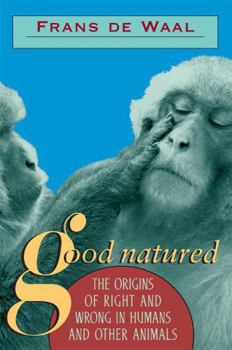Good Natured: The Origins of Right and Wrong in Humans and Other Animals
Select Format
Select Condition 
Book Overview
To observe a dog's guilty look.
Format:Paperback
Language:English
ISBN:0674356616
ISBN13:9780674356610
Release Date:October 1997
Publisher:Harvard University Press
Length:368 Pages
Weight:1.27 lbs.
Dimensions:0.9" x 6.1" x 9.3"
Customer Reviews
5 ratings
Just a good book
Published by Thriftbooks.com User , 17 years ago
I found the book to be highly readable and subject matter to be fascinating. This subject is no where near my field (which is history) but found that De Waal presents the material in way that is very accessible to anyone. De Waal has an entertaining writing style that keeps you absorbed in the reading without the effort I have found in other books on the subject. It's very important for us to really look at where we come from and why we are what we are, and taking a look at our closest relatives is a good window into our minds. I found the analysis and the conclusions to be well formed and fairly presented. The evidence he gives for his conclusions is well documented and explained. While I did have a few problems here and there, these did not detract from the overall readability and the pure enjoyment of the book. This was just a very enjoyable book that I would recommend to anyone, whether you have a deep interest in the topic or you're just looking for an interesting book to use up a few hours in the day.
Brilliant
Published by Thriftbooks.com User , 18 years ago
De Waal is brilliant, objective, careful in reaching conclusions, ethical, a good writer, and has a lot to say. He is very much aware of research in related fields, such as developmental psychology. He and others place great store on observation of animals in natural settings, but also use controlled experimentation, analogous to the type of studies psychologists are always performing on college students. While I think this was an outstanding book, I would acknowledge that the beginning is slower reading than the end: more focused on the necessary vocabulary, some of the controversies, more argumentative, a little redundant. De Waal contrasts "lower" primates and chimpanzees so that we can better understand the evolution of morality, and such distinctions as that between learned adjustment and true empathy. Chimps will mourn, console, deceive; the alpha male will intervene in disputes where the only objective can be restoration of harmony. As all animals, their adaptive potential exceeds the range of behavior observed in natural settings. For example, in the wild, females do not usually spend much time with other adult females, whereas in captivity they do. In captivity, they may use their friendships/alliances to control overly aggressive males, and even influence who becomes the alpha male. While morality has a genetic basis, even in monkeys there is a cultural component. In one experiment, aggressive rhesus adolescents learned to be more tolerant after living with more peaceful stump tailed macaques for 6 months. The adaptive potential of morality is that it fosters group cohesion, which for many species is essential for defense against predators, or to find or protect resources. This is not to deny that one basis of morality is the selfish gene: by helping kin, you are helping some of your own genes to survive, so "altruistic genes" tend to perpetuate themselves.
Compelling, thought-provoking study of primate behavior
Published by Thriftbooks.com User , 22 years ago
Frans de Waal is one of the best known primatologists in the United States, and GOOD NATURED shows why. This careful study of primate behavior, both non-human and human, explores the issue of morality and the complex emotions that give rise to it. De Waal's topics range from empathy to social rules to diplomacy as he describes specific examples across primate species.The black and white pictures illustrate his points, but they are by no means the highlight of this book. De Waal's insights, which never read too much into specific behaviors, walk the fine line between objective scientific reporting and an acknowledgment of the kinship between all primates. Seeing primates through his expert eyes is an enlightening experience. This is truly an extraordinary book. I recommend it to readers who have a keen interest in primatology, sociology, and/or the kinship between humans and other species.
perfect for comparative social psychology
Published by Thriftbooks.com User , 26 years ago
i concur with the previous reviewer's thoughts about this wonderful book. as someone who studies human organisations, i believe that de waal's book (and probably to my forthcoming delight a lot more of ethological psychology) sparks some interesting ideas about how human social control and organisation work. particularly topical are the links to evolution and its role in how we and our fellow higher-order primates organise ourselves.
A thoughtful consideration of ethical origins
Published by Thriftbooks.com User , 26 years ago
A colleague and I chose this book as our "science selection" for our freshman studies classes at a small private college in the midwest. It's been a great choice. De Waal's approach is careful and considered; he is able to talk about ethics among non-human primates without anthropomorphizing. Even better, unlike some of his predecessors in what he calls "classical sociobiology," De Waal does not leap primate species in a single bound. Rather, he considers such issues as altruism and hierarchy in the bonobo, chimp and monkey universes on their own terms. This book is post-sociobiology and post-ethology without succumbing to glib anti-science perspectives. De Waal is a superb writer. His style has absolutely captivated two classrooms full of bright college freshmen. The subject matter is fascinating. This book is a marvelous mix of natural and social sciences. I envy De Waal's Emory office with the window view of Yerkes Center chimp life. What an amazing way to live!





